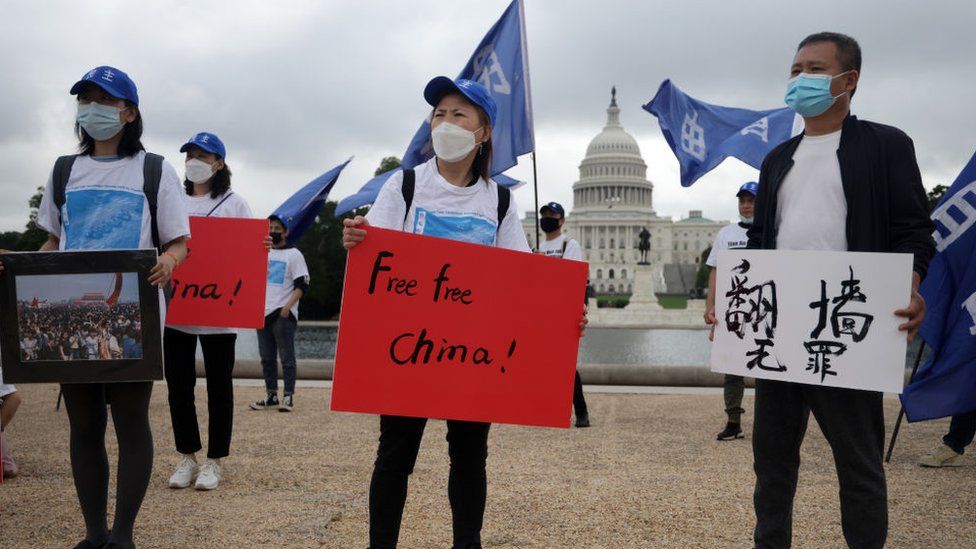ARTICLE AD BOX
By Bernd Debusmann Jr
BBC News, Washington
 Image source, Getty Images
Image source, Getty Images
Chinese dissidents in the US marking the 32nd anniversary of the Tiananmen Square protests last year
As a long-time dissident and California-based opponent of the Chinese government, Arthur Liu - the father of US Olympic figure skater Alyssa Liu - was not particularly surprised when a phone call came from the FBI.
"They told me that the Chinese government had sent spies over to the Bay Area to gather me and my daughter's passport information," he told the BBC. "I wouldn't say I was shocked. But I thought to myself, 'wow' - they're taking this very seriously."
At first, Mr Liu didn't make the connection: A "fishy" phone call from a man claiming to be from the US Olympic and Paralympic Committee, claiming to be conducting a "preparedness check" ahead of his daughter's trip to the Beijing Winter Olympics in February 2022.
"I didn't completely realise that it was from someone other than the Olympic committee," Mr Liu recalled. "I just decided to do the right thing and not give up any information. That's just not how we normally submit passports."
The man on the other end, US authorities believe, was Anthony Ziburis, a 49-year old former Florida correctional officer and bodyguard.
His mission: To spy on and discredit Chinese dissidents on behalf of China's intelligence service. The dissidents reportedly included two American citizens - Mr Liu and Yan Xiong, a retired US Army chaplain and congressional candidate who'd previously been involved in the 1989 Tiananmen Square protests.
In March, Mr Ziburis was charged by the US Justice Department with spying for the Chinese government. But he is far from the only one. This year alone, US officials have charged at least 12 people - including several American citizens - with stalking, harassing and spying on US residents for China.
On 8 July, two other people who were allegedly part of same scheme as the one targeting Mr Liu were also charged.
Mr Liu's case comes amid mounting alarm both in the United States and Britain over an increase in Chinese spy activities worldwide.
In an unprecedented joint public appearance this week at the headquarters of MI5 in London, the heads of the US and UK security services each warned of a vast cyber-espionage network and hacking programme - larger than that of every other major country combined - being run by China.
These programmes are believed to be part of a wider, growing and multi-faceted intelligence effort to give China an edge over its rivals and silence or suppress perceived menaces to the Chinese Communist Party's rule.
The efforts take the shape of everything from scams on computers to spies at the door.
Former US intelligence officials note that people most likely to be targeted are those deemed to have connections to what the Chinese government has identified as "Five Poisons" that threaten it: Tibetan and Uyghur separatists, the Falun Gong spiritual movement, Taiwanese independence activists and - as was the case with Mr Liu - members of China's pro-democracy movement.
Alarmingly, these efforts are only expected to grow amid deteriorating Sino-US relations, and even Americans are not safe.
Image source, UK pool via ITN
Image caption,MI5 head Ken McCallum (left) and FBI director Christopher Wray (right) made an unprecedented joint appearance in London
For Mr Liu - who escaped from China through Hong Kong in the aftermath of the 1989 Tiananmen Square democracy protests - the prospect of being spied upon was a familiar one.
A previous effort, he said, ended when he unknowingly befriended a would-be agent - a student he was introduced to through a contact in the local Chinese diaspora network, for whom he had helped find housing in the US.
"A year or two later, he told me that they'd asked him to spy on me. It was a condition for him to come [to the US]," Mr Liu said. "But then he didn't want to do it".
Espionage against Chinese targets living abroad comes in many forms, ranging from attempts to hack their emails and devices to the planting of human agents inside their social circles or expatriate organisations.
Often, electronic methods are used as "an enabler" of human spying.
"You could stalk someone online, and get a sense of their contacts," said Christopher Johnson, a former senior China analyst at the Central Intelligence Agency. "Then maybe you approach those people. One thing leads to another".
Dissidents such as Mr Liu are targeted because the Chinese government believes they are part of a "global narrative battle" between China and the West, Mr Johnson added.
Those who publicly speak out against the regime potentially hamper China's efforts to portray itself in a positive light.
This has taken on "renewed importance in the last couple years," he said. "'Discourse Power' is the is the clunky Marxist term they use. It's this idea that they should tell China's story themselves, through their own propaganda".
The Chinese government could not be reached for comment. In March - when Mr Ziburis was charged - Foreign Ministry Spokesman Zhao Lijian accused the US of "unwarranted denigration and smearing" against China.
Current and former US intelligence officials, however, have repeatedly warned of a vast Chinese spying campaign in the US.
In a speech earlier this year, FBI Director John Wray said that Chinese espionage operations in the US are "more brazen" than ever before.
This is particularly true given the Biden administration's framing of US-China rivalry as part of a struggle between autocracy and democracy, said Mr Johnson.
The recent indictments, he and two other officials told the BBC, are unlikely to make China stop trying.
According to the FBI, the bureau opens up a new China-related counter-intelligence case every 12 hours. As of February, more than 2,000 cases were open.
Despite this, Mr Johnson called US efforts to stop Chinese espionage "dismal".
"They're willing to put a lot more effort into doing it than we are try in trying to deter it," he said.
The FBI has estimated that there are "hundreds" of dissidents in the US that China hopes to target as part of an increasingly aggressive campaign of seeking out personal and political retribution.
"Most of the targets are green card holders [or] naturalised citizens - folks with important rights and protections under US law," Director Wray has said.
Image source, Getty Images
Image caption,Protesters in China's Tiananmen Square in 1989
Mr Liu, for his part, said he doesn't believe that espionage efforts against him will ever go away.
The more recent attempt, however, had an added complication. At the time of the FBI's call, it was almost certain that Alyssa Liu - who had posted content about China's treatment of its ethnic Uyghur minority on social media - would be headed to Beijing.
Mr Liu said he was "tremendously worried" for her safety - but chose not to tell her at the time.
"I didn't want her to go to China with a heavy burden on her shoulders," he said. "I wanted her to go and enjoy the Olympic experience".
A year on, he said he won't be surprised if the FBI were to contact him again, although he hopes to "not have to do this again".
"I've learned to carry on like a normal person. They [the Chinese government] can do whatever they want, I can't stop it. I don't care," he said.
"I will continue to speak up against such conduct and against any kind of human rights violations. Nothing would stop me from doing that."

 2 years ago
50
2 years ago
50








 English (US)
English (US)